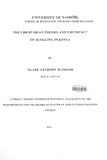| dc.description.abstract | In a relatively short time, bloggers have achieved an unprecedented position at the forefront of a vast marketplace of ideas that hitherto had only been an ideal in the Libertarian theory of the Press. Through digital technology, bloggers are taking freedom of expression to a new level. Although few are doing original reporting for news stories, the bloggers are strong on the opinion part of journalism and offer a robust diversity of points of view.
The bloggers and their readers serve each other, the public and the news media in the self-righting process of libertarian theory -helping to determine the best obtainable version of the truth among conflicting views. Of the four theories of the press, it appears that it's only the Libertarian theory that has thus far accommodated the digital revolution.
The 'Libertarian theory' was the most popular theory of the late 18th and 19th centuries: John Locke, Thomas Jefferson, John Milton, and John Stuart Mill advocated the theory. So are bloggers, journalists? Is it mere hearsay? Should we take blogging seriously? While as the theory hinged its maxim on positive tenets, not all blogs serve to inform the public. It's believed many of them are nothing more than personal tantrums against the society or status quo. To elaborate on this aspect, this paper will strive to highlight how the bloggers conduct themselves in Kenya. | en_US |

